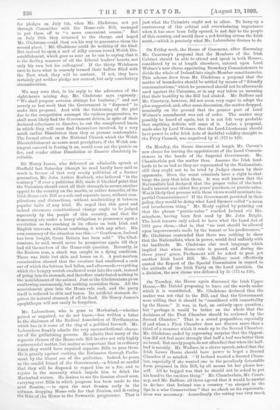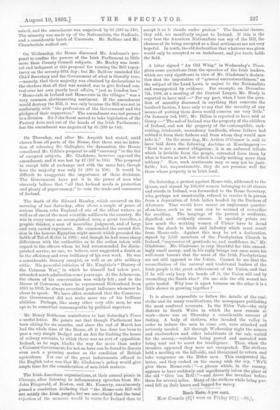On Tuesday, the House again discussed the Irish Upper House,—Mr.
Dalziel proposing to leave out the words under which it is constituted. Mr. Gladstone declared that the matter was not vital to the Bill, and that the Government were willing that it should be "considered with impartiality by the House." It was, in fact, an entirely open question ; but "perhaps it would be better on the whole that the decisions of the First Chamber should be reviewed by the Second Chamber." That is a sound proposition, especially if and when a First Chamber does not discuss more than a third of a measure which it sends up to the Second Chamber. Mr. Gladstone ended by expressing surprise that the Opposi- tion did not feel more strongly that half a loaf was better than no bread. But surelypeople do not often feel that when the half- loaf is mouldy. Mr. Wallace, in a clever speech, asked that the Irish Lower House should have power to beget a Second Chamber if so minded. "If Ireland wanted a Second Cham- ber, especially if she wanted one in the peculiarly detestable form proposed in this Bill, by all means let her please her- self. All he begged was that he should not be asked to put his hand to the unclean thing." Mr. Chamberlain, Mr. Court- ney, and Mr. Balfour, all three agreed that it would be unwise to declare that Ireland was a country " so steeped to the lips in a wise Conservatism" that no check on its representa- tives was necessary. Accordingly the voting was very much mixed, and the amendment was negatived by 83 (193 to 110). `The minority was made up of the Nationalists, the Radicals, and a considerable batch of Unionists. Mr. Balfour and Mr. Chamberlain walked out.



































 Previous page
Previous page